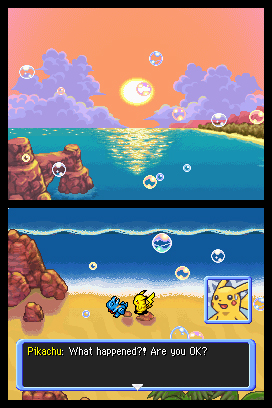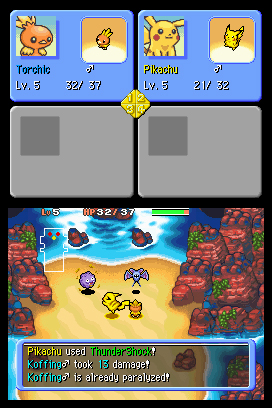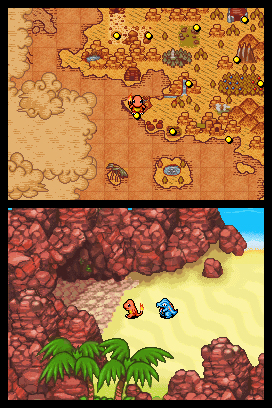Pokémon Mystery Dungeon: Explorers of Time/Darkness (Nintendo DS) Review
By Karn Spydar Lee Bianco  03.08.2008
03.08.2008
Despite being a family-friendly handheld, the Nintendo DS is no stranger to the intensely 'hardcore' genre of the roguelike. While it might seem like an odd choice to combine the randomly generated dungeons, unforgiving difficulty, and severe consequences of the genre with the cutesy, 'gotta catch 'em all' world of Pokémon, that's precisely what Japanese developer Chunsoft has done (at least, in part).
In keeping with Pocket Monster tradition, Pokémon Mystery Dungeon: Explorers of Darkness and Explorers of Time, although technically separate titles, only differ very sightly from one another (in this case, by the inclusion/exclusion of a select few Pokémon that can only be acquired by trading with other players). Explorers of Darkness is the focus of this review, but our critique will hold true for both titles. With more than 480 Pokémon to collect and the ability to trade online via the Nintendo Wi-Fi connection, there's really no need to worry about which version you should choose. Whether you should be choosing to purchase the game at all, however, is something we aim to help you ascertain over the coming paragraphs.
Plot-wise, EoD and EoT follow much the same route as their predecessor(s): you play as a Pokémon who is suffering from amnesia, but knows that he/she was once a human and is searching for answers. A brief personality test determines which critter you will become, but you are free to choose a companion from a list of sixteen eligible Pokémon. Once the game's introductory scenes and battles are over, you'll join the Wigglytuff Guild, form an exploration team, and start taking on missions to bag yourself some money, items, and experience points. Up to three other Pokémon can accompany you into dungeons at any given time, but many more can be recruited in the field and sent back to the Guild for later use.

Team members cannot be controlled directly, but can be issued commands that instruct them to follow you, attack nearby opponents, use certain moves more often etc.. Unfortunately, most recruits tend to make a habit of standing around aimlessly during battles, or even getting lost and eventually mauled by roaming predators. It's possible to quickly traverse dungeons by moving in straight lines at double speed, and it's during these bursts of speed that your companions tend to get confused and wander off. What's worse is when said Pokémon encounters an opponent and you're brought to a halt, forced to watch the ensuing battle, and restricted to move one space per turn until the battle is over. Changing behaviour orders helps alleviate the problem to some extent, but it's not a flawless solution.
In comparison to other roguelikes, which rely on one or two attacks, EoD mixes things up by allowing each Pokémon to learn up to four moves. Fans of the core Pokémon series will instantly recognise the moves on offer, as well as the elemental modifiers that come with them. Alas, being unable to swap between members of your party mostly nullifies any possibility of strategically taking advantage of elemental differences. Entering a battle against a Pokémon that one of your team would be perfectly suited to dispatch, only to realise that there's no easy way to get that Pokémon to the front line, is frustrating to say the least. Even if you can place your team appropriately there's no guarantee that they will use the attacks you want them too.

With the exception of this rather lackluster AI, EoD ultimately provides the mechanics for the sort of solid dungeon-crawling experience that we've come to expect from Chunsoft. One of the game's more controversial flaws, though, is its lowered difficulty and the removal of certain roguelike trademarks. For example, there's no loss of experience on death (you only lose money and certain items) and unidentified items are entirely absent, with the game offering detailed descriptions for everything you find in a dungeon. While these are the sorts of 'archaic' features that tend to repel a lot of the players, they're ultimately key in bringing a sense of danger to the roguelike genre. Without them EoD can quickly boil down to a simple grind-a-thon with little of the sense of wonder of accomplishment that makes titles like Shiren the Wander such an absolute joy to play.

While the game does become more challenging later on, it suffers from an unfortunately weak opening. As mentioned, before entering a new dungeon you can take on jobs from the Guild. These jobs involve the likes of finding/rescuing Pokémon, escorting a Pokémon, locating treasure, and so on. Multiple jobs can be completed in a single run-through of a dungeon, but after leaving the dungeon (which won't take long at first, given the low number of floors in early dungeons) you are forced to sit through cut-scenes in which you: receive rewards for your trouble, go to bed to rest, wake up and get told what to do, etc.. It might not seem like much, but the minutes soon start to add up and become increasingly infuriating when all you want to do is get back to some good 'ol dungeon crawling. Any sense of discovery is also diluted when you know you'll be whisked away to safety on a regular basis.
Despite being a single-player experience at heart, EOD offers a wealth of online functionality that helps to bring a social element to the game. Now a staple of Chunsoft's Mystery Dungeon titles on the DS, rescues make a return, allowing players who have died in a dungeon to send out an SOS to friends and strangers either locally or via Wi-Fi. While the feature isn't quite as useful as it was in Shiren due to the EoD's less challenging nature, the number of willing rescuers is improved as a result. Additional Wi-Fi features include the option to send items to other players, and even teams of Pokémon for other players to train against in the Dojo (a risk-free dungeon). A particularly neat feature allows players to register their email address and/or mobile number in order to receive notifications regarding successful rescue attempts, new mail, and so on.

Cubed3 Rating
Good
Chunsoft did a brave thing with Explorers of Darkness (and its sibling/predecessors) by attempting to meld the fun-for-everyone, 'gotta catch 'em all' world of Pokémon with the unforgiving nature of the roguelike genre. Unfortunately, the result is a game that cannot compete with the likes of Shiren the Wanderer because it doesn't offer the same sense of accomplishment, nor does it sufficiently reward players for opting to play strategically instead of simply level-grinding. Younger players might get a kick out seeing their favourite Pokémon in a new light, but others should probably stick to 'purer' roguelikes like Shiren, or more standard RPGs like the core Pokémon titles.

![]() 6/10
6/10
![]() 8/10
(6 Votes)
8/10
(6 Votes)
 Out now
Out now  Out now
Out now  Out now
Out now  Out now
Out now Comments
Comments are currently disabled

 Sign In
Sign In Game Details
Game Details Subscribe to this topic
Subscribe to this topic Features
Features





 Top
Top

